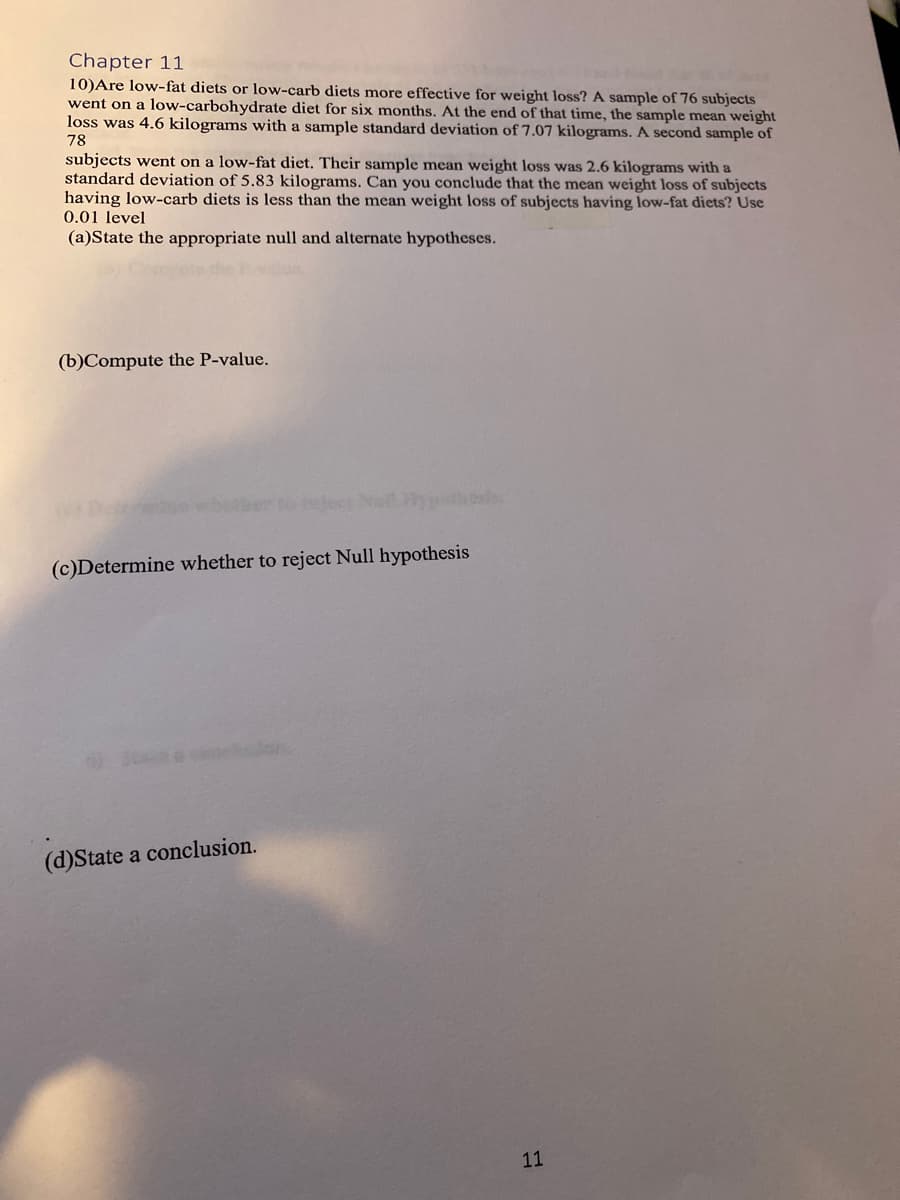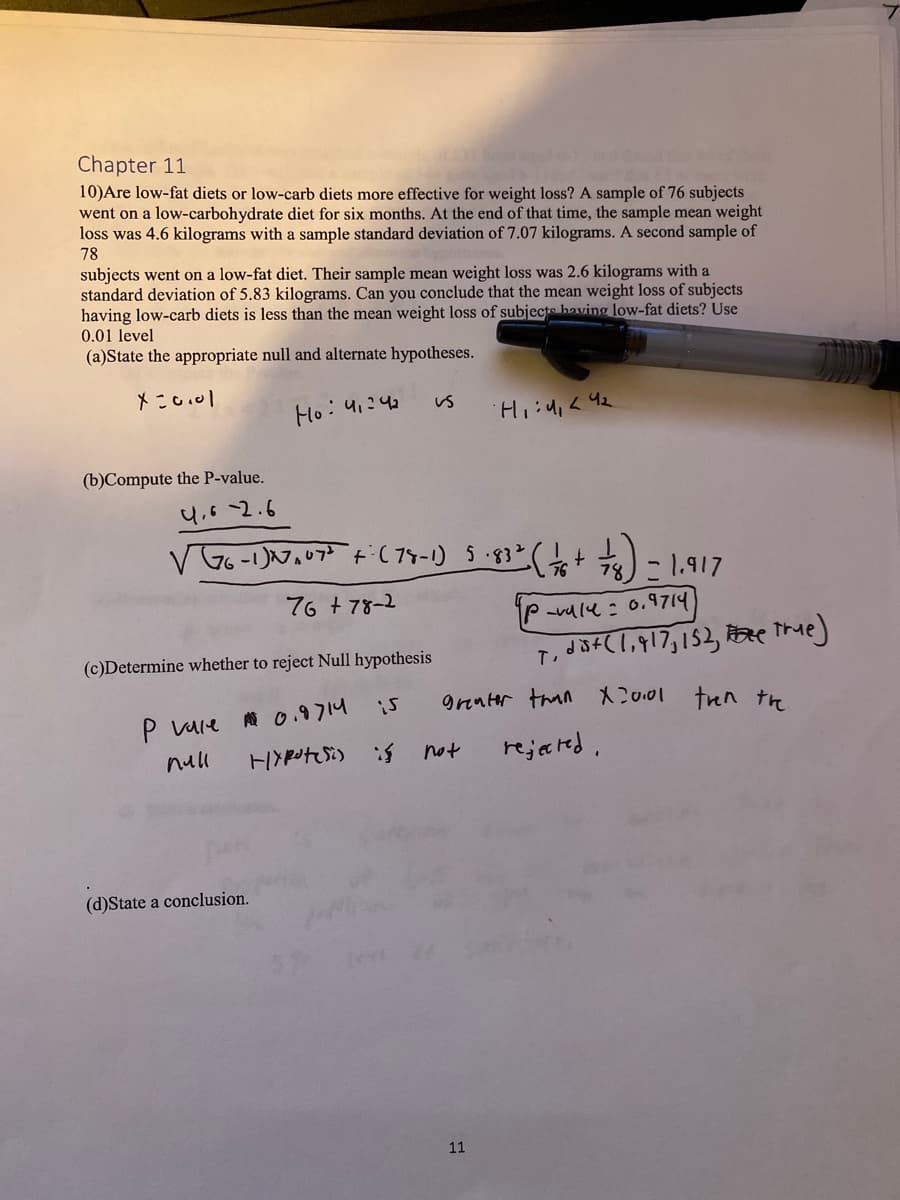Chapter 11 10) Are low-fat diets or low-carb diets more effective for weight loss? A sample of 76 subjects went on a low-carbohydrate diet for six months. At the end of that time, the sample mean weight loss was 4.6 kilograms with a sample standard deviation of 7.07 kilograms. A second sample of 78 subjects went on a low-fat diet. Their sample mean weight loss was 2.6 kilograms with a standard deviation of 5.83 kilograms. Can you conclude that the mean weight loss of subjects having low-carb diets is less than the mean weight loss of subjects having low-fat diets? Use 0.01 level (a)State the appropriate null and alternate hypotheses.
Chapter 11 10) Are low-fat diets or low-carb diets more effective for weight loss? A sample of 76 subjects went on a low-carbohydrate diet for six months. At the end of that time, the sample mean weight loss was 4.6 kilograms with a sample standard deviation of 7.07 kilograms. A second sample of 78 subjects went on a low-fat diet. Their sample mean weight loss was 2.6 kilograms with a standard deviation of 5.83 kilograms. Can you conclude that the mean weight loss of subjects having low-carb diets is less than the mean weight loss of subjects having low-fat diets? Use 0.01 level (a)State the appropriate null and alternate hypotheses.
Glencoe Algebra 1, Student Edition, 9780079039897, 0079039898, 2018
18th Edition
ISBN:9780079039897
Author:Carter
Publisher:Carter
Chapter10: Statistics
Section10.3: Measures Of Spread
Problem 1GP
Related questions
Question
Already did A B and C. Just need help with D

Transcribed Image Text:Chapter 11
10)Are low-fat diets or low-carb diets more effective for weight loss? A sample of 76 subjects
went on a low-carbohydrate diet for six months. At the end of that time, the sample mean weight
loss was 4.6 kilograms with a sample standard deviation of 7.07 kilograms. A second sample of
78
subjects went on a low-fat diet. Their sample mean weight loss was 2.6 kilograms with a
standard deviation of 5.83 kilograms. Can you conclude that the mean weight loss of subjects
having low-carb diets is less than the mean weight loss of subjects having low-fat diets? Use
0.01 level
(a)State the appropriate null and alternate hypotheses.
(b)Compute the P-value.
(c)Determine whether to reject Null hypothesis
(d)State a conclusion.
11

Transcribed Image Text:Chapter 11
10) Are low-fat diets or low-carb diets more effective for weight loss? A sample of 76 subjects
went on a low-carbohydrate diet for six months. At the end of that time, the sample mean weight
loss was 4.6 kilograms with a sample standard deviation of 7.07 kilograms. A second sample of
78
subjects went on a low-fat diet. Their sample mean weight loss was 2.6 kilograms with a
standard deviation of 5.83 kilograms. Can you conclude that the mean weight loss of subjects
having low-carb diets is less than the mean weight loss of subjects having low-fat diets? Use
0.01 level
(a)State the appropriate null and alternate hypotheses.
x=0.01
Ho: 4₁24₂
(b)Compute the P-value.
4.6 -2.6
(c)Determine whether to reject Null hypothesis
A 0.9714
Hypot(Si)
VG6-1) 27² ₂07³ +- (78-1) 5.83²
76 +78-2
P vale
null
(d)State a conclusion.
Us
is
H₁:4₁ <4₂
5.83² (1/6 +
not
11
1/481) = 1.917
78
greater than X20.01 then the
rejected.
p-valu : 0,9714
T, dist(1,917, 152, true)
Expert Solution
This question has been solved!
Explore an expertly crafted, step-by-step solution for a thorough understanding of key concepts.
This is a popular solution!
Trending now
This is a popular solution!
Step by step
Solved in 2 steps

Recommended textbooks for you

Glencoe Algebra 1, Student Edition, 9780079039897…
Algebra
ISBN:
9780079039897
Author:
Carter
Publisher:
McGraw Hill

Holt Mcdougal Larson Pre-algebra: Student Edition…
Algebra
ISBN:
9780547587776
Author:
HOLT MCDOUGAL
Publisher:
HOLT MCDOUGAL

Glencoe Algebra 1, Student Edition, 9780079039897…
Algebra
ISBN:
9780079039897
Author:
Carter
Publisher:
McGraw Hill

Holt Mcdougal Larson Pre-algebra: Student Edition…
Algebra
ISBN:
9780547587776
Author:
HOLT MCDOUGAL
Publisher:
HOLT MCDOUGAL